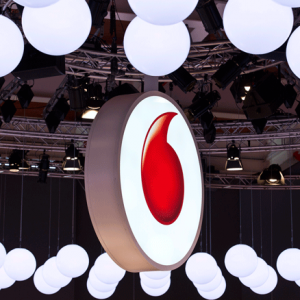
After more than 40 years of operation, DTVE is closing its doors and our website will no longer be updated daily. Thank you for all of your support.
Vodafone’s growth story
 Vodafone, which posted its first quarterly results this week under new CEO Nick Read, has had a torrid time of it over the last few months. Its share price has fallen by over a third since the start of the year, driven lower by concern among investors that debt incurred from its €19 billion acquisition of Liberty Global’s German and CEE assets would force it to cut its dividend.
Vodafone, which posted its first quarterly results this week under new CEO Nick Read, has had a torrid time of it over the last few months. Its share price has fallen by over a third since the start of the year, driven lower by concern among investors that debt incurred from its €19 billion acquisition of Liberty Global’s German and CEE assets would force it to cut its dividend.
In fact, Read maintained the telco’s attractive dividend when the company’s first half results were announced and promised to maintain the full-year dividend at last year’s levels. But Vodafone’s performance has been far from stellar. For the first half, the company posted revenues of €21.8 billion, down 5.5%, and a loss of €7.8 billion, due to a loss on the disposal of Vodafone India and impairment charges related to its performance in Spain and Romania.
Operationally, Spain has become a key weak point since Vodafone decided not to license key football rights held by Telefónica because the price made them unprofitable. This has allowed Telefónica and Orange, which also carries the relevant football coverage, to relentlessly target its base, leading to a loss of 98,000 TV customers and 118,000 broadband subscribers.
The trouble in Spain aside, Vodafone’s future strategy, and its finances, have become closely entwined with its acquisition of Liberty Global’s German and CEE businesses – currently attracting the unwelcome interest of German regulators. The debt incurred as a result of the acquisition cast further doubt among investors about Vodafone’s ability to maintain its dividend, but Read has held out the prospect that the additional cash-flow from Liberty’s businesses will enable the company to keep the dividend up.
Underpinning Vodafone’s growth story more generally is a belief that the future lies in delivering convergence and achieving scale.
The Liberty acquisition helps it achieve both, enabling it to target consumers across the German market, where it already owns cable unit Kabel Deutschland as well as its mobile operation, with a fully converged offering. (Liberty Global itself has been noticeably quieter about proselytising the benefits of adding mobile to its fixed-line triple-play, although it also markets fixed-plus-mobile offerings to its customers).
In Germany, where Vodafone also lost some subscribers in the first half, including a sizeable number of TV homes, it nevertheless increased its base of converged customers as a proportion of the total thanks to its GigaKombi offering, which combines fixed and mobile services. Converged customers – paying more than single product customers and less likely to churn – increasingly feature prominently as a key metric in telecom and cable operators’ quarterly earnings statements, and Vodafone is no exception.
If convergence is the route to growth for Vodafone and other big telcos, scale – and making the most of that scale to drive efficiency – is the route to delivering profitability from convergence. Vodafone has put together a range of fixed assets across multiple territories to complement its mobile service provider business. In Germany and Spain, this principally means HFC cable. In the UK it has recently meant teaming up with disruptive new entrant CityFibre, which wants to build out fibre networks to 100 key cities on a wholesale-only model.
On this H1 earnings call, Read rejected adding TV, a fourth wheel in the quad-play convergence bundle, to its UK offering in the near future on the grounds that it was better to do “a few things really well” than many things badly. However, he added that the company would “overlay TV” at some point in the future on the basis of the company-wide cloud-based TV platform it is developing.
That cloud-based platform is a clear example of using scale to deliver efficiencies. For Vodafone, with its ragbag of assets scattered across multiple countries and within individual markets, relying on technologies that can be scaled across diverse physical network types is crucial to making the most of its size.
Scale could also benefit Vodafone as it squares up to its next big challenge: building out 5G. Technical issues notwithstanding, its ownership of multiple fixed assets should in theory at least enable it to deliver 5G backhaul for its mobile operations more efficiently.
Nevertheless, the funds required for 5G will of course be weighing heavily on investors’ minds. Telecom operators’ work is never done. For Vodafone, seeing its bet on convergence to deliver the necessary cash-flow to keep the show on the road will be more vital than ever in the years ahead.


